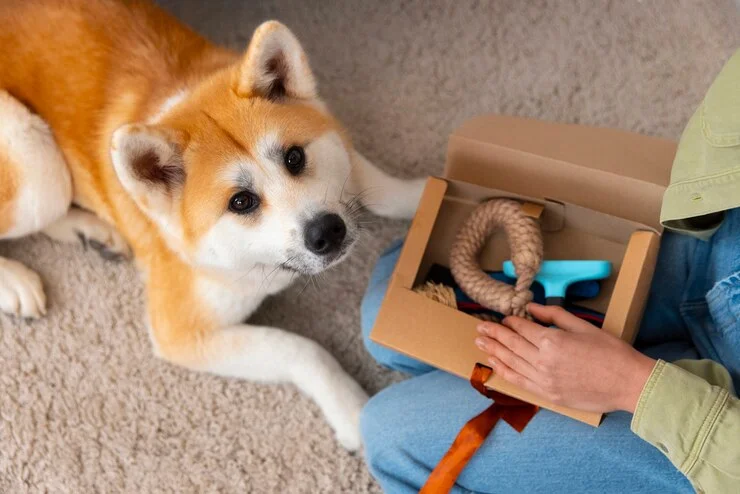-
P, 193, A, Ramakrishna Samadhi Rd,Kolkata- 700054
P, 193, A, Ramakrishna Samadhi Rd,Kolkata- 700054

Learn how to boost your pet’s weight in a healthy and effective way. At one of the best pet clinics, our experts provide tailored guidance and treatments to ensure your pet’s well-being. Discover more today!

When it comes to caring for your pet, their health and well-being are your top priorities. One aspect of their health that might not get as much attention as it deserves is their weight. Whether you have an underweight pet due to illness, stress, or a naturally lean build, or you’re simply looking to ensure that your pet is thriving, boosting your pet’s weight in a healthy and safe way is essential. APC pet’s speciality clinic & referral care always take care for Diagnostic Tests for Pets for check up it’s weight.
In this guide, we’ll explore various high-calorie foods that can help you boost your pet’s weight, focusing on the best approaches and foods to use. We’ll also discuss practical tips on how to manage your pet’s diet effectively and answer some frequently asked questions on how to support your pet’s weight gain.
Before diving into the best high-calorie foods for your pet, it’s important to understand why weight gain is necessary. Maintaining a healthy weight is crucial for pets’ overall health, as being underweight can lead to a weakened immune system, slower recovery from illnesses, and a lack of energy. A pet that is underweight may also struggle with muscle development, which can lead to joint issues or lethargy.
However, simply feeding your pet anything high in calories is not enough. It’s essential to choose nutritious, calorie-dense foods that support their health while helping them gain weight. Let’s look at some of the top high-calorie foods you can introduce to your pet’s diet.

Canned wet food is often more calorie-dense than dry kibble and can be a great choice for pets who need to boost their weight. It contains higher moisture content, which helps pets stay hydrated, but the calories packed into the food are often richer and easier for your pet to digest. Some premium wet foods are specifically formulated for weight gain, providing higher fat content than regular foods.
Benefits:
Recommended Choices:
Peanut butter is a high-calorie treat that many pets enjoy. It’s an excellent way to add extra calories and healthy fats to your pet’s diet, especially if they are a picky eater. It’s also rich in protein, making it an ideal snack for pets who need to gain weight.
Benefits:
Note: Always ensure the peanut butter you use does not contain xylitol, as it’s toxic to pets.
How to Use:
Pumpkin is not only a low-calorie food, but it’s also a high-fiber one that helps with digestion. For pets that are underweight, adding a small amount of pumpkin to their meals can encourage them to eat more while supporting healthy gut function. Plus, it’s a great source of vitamins like A and C.
Benefits:
How to Use:
Cottage cheese is an excellent source of protein and fat, making it an ideal food to boost your pet’s weight in a healthy way. It’s gentle on most pets’ digestive systems and can be added to their regular meals to increase their caloric intake.
Benefits:
How to Use:
Eggs are one of nature’s most complete sources of protein and fat, making them a fantastic addition to your pet’s diet when trying to help them gain weight. They are easy to prepare and digest, providing essential amino acids for muscle growth and repair.
Benefits:
How to Use:
Fish oil, especially from salmon, is an excellent source of omega-3 fatty acids, which can help your pet maintain a healthy weight and build muscle. Omega-3 fatty acids also support joint health and the immune system, making them a must-have addition to your pet’s diet if they’re looking to gain weight.
Benefits:
How to Use:
Bone broth is nutrient-dense, packed with collagen, protein, and amino acids. It’s an excellent way to increase your pet’s calorie intake without overloading them with heavy foods. Plus, it’s an excellent way to hydrate your pet, which is especially important if they’re not drinking enough water.
Benefits:
How to Use:
Sweet potatoes are a highly nutritious and calorie-dense vegetable that can provide your pet with the energy they need to gain weight. They are rich in vitamins A and C and are an excellent source of dietary fiber.
Benefits:
How to Use:
Also have a look at it:- A Guide to Healthy Weight Gain for Pets
While feeding your pet high-calorie foods is an important part of boosting their weight, it’s also essential to monitor their overall health to ensure the weight gain is healthy. Here are some tips to keep in mind:

Q1: How can I know if my pet is underweight?
A: Look for signs such as visible ribs, a lack of muscle tone, or a protruding spine. If your pet has little energy or seems lethargic, it may be underweight. Consult your vet for a professional assessment.
Q2: How can I help my pet gain weight if they have a poor appetite?
A: If your pet is struggling with a low appetite, try offering them more palatable options like canned wet food, peanut butter, or cooked meat. Warming up their food or adding a bit of fish oil can also make the food more enticing.
Q3: Can I give my pet human food to help them gain weight?
A: Some human foods like peanut butter, eggs, and plain cooked meats are safe for pets in moderation. However, avoid feeding them spicy, salty, or seasoned foods that could upset their stomachs or harm their health.
Q4: When should I consult a veterinarian about my pet’s weight?
A: If your pet is consistently underweight or losing weight without any apparent reason, consult a veterinarian. They can identify underlying health issues and help develop a safe weight gain plan.
Helping your pet gain weight should be done thoughtfully, considering their specific nutritional needs. Introducing high-calorie, nutrient-rich foods like canned wet food, eggs, sweet potatoes, and cottage cheese into their diet can help boost your pet’s weight in a healthy and balanced way. It’s essential to monitor your pet’s overall health during this process. For professional advice and personalized care, consult the Best Pet Clinic in Kolkata, especially when introducing new foods or making dietary adjustments. By following these guidelines and collaborating with your vet, you can ensure your pet gains weight safely, promoting their well-being and longevity.